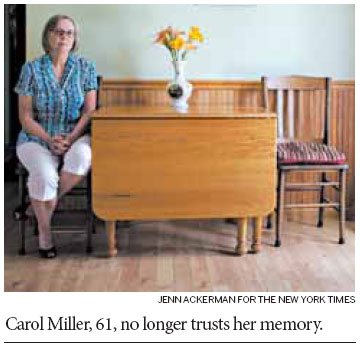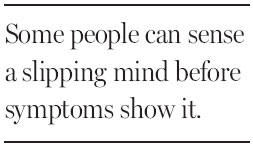Finding dementia years before tests
Updated: 2013-08-11 08:07
By Pam Belluck(The New York Times)
|
|||||||||


The man complained of memory problems but seemed perfectly normal. No specialist he visited detected any decline.
"He insisted that things were changing, but he aced all of our tests," said Rebecca Amariglio, a neuropsychologist at Brigham and Women's Hospital in Boston. But about seven years later, he began showing symptoms of dementia. Dr. Amariglio now believes he had recognized a cognitive change so subtle "he was the only one who could identify it."
Now, scientists are finding that some people with such complaints may in fact be detecting early harbingers of Alzheimer's.
Studies presented in July at an Alzheimer's Association conference in Boston showed that people with some types of cognitive concerns were more likely to have Alzheimer's pathology in their brains, and to develop dementia.
And, in a significant shift, leading Alzheimer's researchers are identifying a new category called "subjective cognitive decline," which is people's own sense that their memory and thinking skills are slipping even before others have noticed.
"These people are sensing something, and there's some biological signals that correlate," said Dr. Ronald C. Petersen, chairman of the advisory panel to the American government's new National Alzheimer's Project. "I think it's real."
Experts emphasize that people who forget what they wanted in the kitchen or the names of relatively unfamiliar people are probably aging normally. People who forget important details of recent events, get lost in familiar places or lose track of book or television plots may not be, especially if they have more problems than others their age.
It is also unclear if the worry reflects the changes people sense or if worrying itself increases risk.
But subjective screening has value now for clinical trials, experts say, because it can help pinpoint people at higher risk of dementia.
Dr. Frank Jessen, a researcher at the German Center for Neurodegenerative Diseases, said that in diseases like arthritis and Parkinson's, people often feel something is wrong before others notice. In most phases of dementia, family members and friends see deficits, but the disease has usually stolen the person's ability to recognize them. But at the subjective phase, studies suggest family members may miss problems; the person may feel his mind working harder, but he still functions well.
One of Dr. Richard Caselli's patients, Roger Siegel, 84, has noticed problems for at least five years. "I take a shower and wonder did I wash that leg," he said. Neither his wife nor Dr. Caselli, a neurology professor at the Mayo Clinic in Arizona, perceive the difficulties.
But recent cognitive measures showed he had "slight decline on his tests, and so may possibly be at a very early stage of a very slowly progressive degenerative syndrome," Dr. Caselli said.
A working group headed by Dr. Jessen aims to develop standardized subjective cognitive tests so when treatments become available doctors can eventually use them to help identify people at greater risk, Dr. Petersen said.
Current tests range from an eight-page assessment in Dr. Amariglio's research to one question included in a broader University of Kentucky study of dementia.
Carol Miller, 61, a registered nurse who retired after being laid off a few years ago, said she has forgotten cardiovascular and neurological vocabulary that once came easily. "I don't trust myself as a safe R.N. because I don't have the knowledge anymore."
Still, she said, "so far they tell me I'm normal."
The New York Times
(China Daily 08/11/2013 page11)